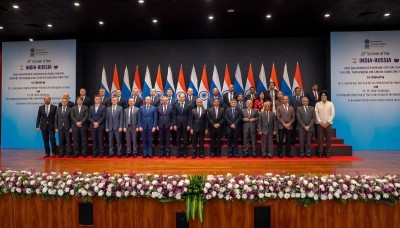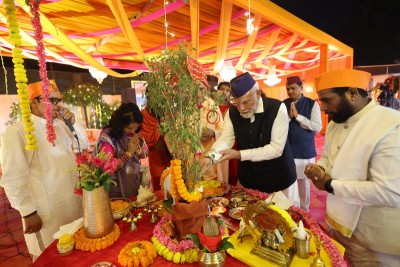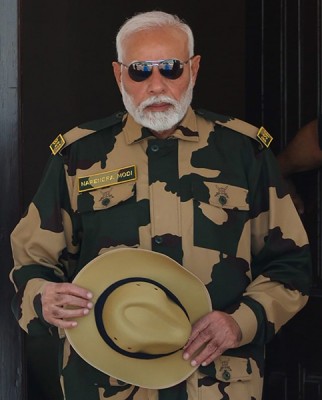
Heresy, Thy Name
On October 25, 2019, an Ahmadi place of worship located in Chak 161 Murad in Hasilpur village of Bahawalpur District in Punjab was demolished by the Police. The ‘operation’ was led by the Assistant Commissioner of Hasilpur, Mohammad Tayyab.
A place of worship for Ahmadi Muslims in Pakistan cannot be called a mosque under Pakistani Law, which prohibits Ahmadis from claiming to be Muslim, under Ordinance XX [Anti-Islamic Activities of the Quadiani Group, Lahori Group and Ahmadis (Prohibition and Punishment) Ordinance (1984)]. Earlier, through the Second Amendment of the Constitution, the Ahmadis were declared ‘non-Muslims’ in 1974.
Ahmadis also face harassment, threats, employment termination, social ostracism, abduction, torture and even death. They are frequent victims of terrorism and incarceration, most notably evidenced by the 1953 riots of Lahore, in Punjab Province; 1974 Anti-Ahmadi riots and May 2010 attacks on Ahmadi places of worship in Lahore. According to a June 19, 2019, report, about 400 Ahmadis have been killed in Pakistan since the introduction of anti-Ahmadi laws. Many in the community have relocated to Rabwah (Chenab Nagar in the Chiniot District of Punjab), looked upon as a safe haven by Ahmadis.
Some prominent instances of violence targeting Ahmadi places of worship and individuals include:
March 18, 2019: Bullet-riddled bodies of two missing Ahmadi doctors, identified as Iftikhar and Aziz were recovered from a small dam in Dhoke Soba area of Attock District of Punjab Province.
August 24, 2018: 31 people were injured when an Ahmadi place of worship was destroyed in Ghaseet Pura area of Faisalabad District in Punjab Province.
July 7, 2018: In Jaranwala town of Faisalabad District, an Ahmadi couple was shot at and injured by two un-identified gunmen who broke into the house in Abu Zar Colony.
June 27, 2018: An Ahmadi was shot dead in Nishtar Colony area of Lahore city.
May 23, 2018: A 100-year-old Ahmadi place of worship located in the city of Sialkot in the Punjab Province was destroyed by an angry mob.
August 28, 2017: A local Ahmadi place of worship was set on fire by a youth at Muridke in Sheikhupura District of Punjab.
May 3, 2017: An Ahmadi, Basharat Ahmad, from Khanpur in District Rahimyar Khan of Punjab Province was shot dead for his faith, while he was going home on motor bike from his petrol station located outside the city.
April 7, 2017: Prof. Dr. Ashfaq Ahmed, who belonged to Ahmadi community, was shot dead in the Sabzazar area of Lahore.
March 30, 2017: Saleem Lateef, an Ahmadi, was killed in Nankana Sahib District of Punjab, while his son sustained injuries in the attack.
On December 12, 2016: While the Ahmadiyya Muslim Jama’at (AMJ) was holding a peaceful convention at its place of worship in Chakwal District of Punjab, an armed mob attacked and destroyed the structure.
There are also numerous reports of the vandalising of Ahmadi graveyards – whole cemeteries have been desecrated in some cases. These assaults are aimed particularly at the destruction of gravestones because they featured Quranic inscriptions. On December 9, 2013, the word "Muslim" on the tombstone of Pakistani scientist Abdus Salam, a member of the Ahmadi community and Pakistan's only Nobel laureate, was painted over by vigilantes in the Ahmadi graveyard in the town of Rabwah.
More worryingly, anti-Ahmadi rhetoric has become a potent source for politicians to gain or consolidate their sectarian vote banks. Vehement opposition to Ahmadis brought the Tehreek-e-Labbaik Pakistan (TLP) two provincial seats in Sindh in 2018. TLP won the Sindh Assembly seats from PS-107 (Lyari) and PS-115 (Baldia Town) in Karachi.
On the other hand, it was the Ahmadi factor that ended the political career of former law minister Zahid Hamid. Interestingly, before his resignation on November 27, 2017, Hamid released a video message on YouTube to assure the people that he believed in the Finality of the Prophethood of Prophet Muhammad, declaring,
I believe in the Finality of Prophethood. I am not a follower of any claimant of prophethood, nor do I believe that any such claimant of prophethood is a Muslim. Neither do I belong to any Qadiani Group or Lahori Group, nor do I call myself an Ahmadi.
Again, it was the Ahmadi issue, which became the reason for throwing a shoe at three-time Prime Minister Nawaz Sharif during a speech at Jamia Naeemia Seminary in Lahore on March 11, 2018. The attacker screamed slogans in favour of Mumtaz Qadri (killer of Salman Taseer) and Khatm-e-Nabuwat (Finality of Prophethood). The act was in reaction to the ‘amendment’ of Khatm-e-Nabuwat clause in the Election Bill of 2017. The Election Bill, became a cause of controversy, when it was revealed that a declaration regarding the finality of Prophethood had been modified somewhere during the process of its passage. However, the Government had claimed that the modification was the result of a "clerical mistake" and promised to restore the declaration to its original form, which it did in November 2017. Also, on September 7, 2018, the Government asked Princeton University economist Atif R. Mian to step down from the Prime Minister Imran Khan-led Economic Advisory Council (EAC). The decision followed mounting pressure from religio-political parties, including TLP against the appointment of Mian, who is an Ahmadi.
The fundamental doctrinal difference between Ahmadis and Sunni Muslims, on the basis of which the Ahmadi community has historically been deemed heretical by orthodox Sunni Muslims, concerns the status of the founder of the Ahmadi sect, Mirza Ghulam Ahmad, who lived from 1835 to 1908 in the city of Qadian in erstwhile undivided Punjab province (now in the Gurdaspur District of India’s Punjab). The majority of Sunni Muslims believe that Mirza Ahmad was an apostate who claimed Nabuwat or the status of divine prophet for himself. Traditionally, Muslims believe that the Prophet Muhammad is the last prophet to be sent by God, thereby holding the seal of prophecy, a belief that holds a central place in Islamic religious precepts. Any proposition to the contrary is professed to be blasphemous.
The entire situation is murky because the Pakistani State seeks to appease Muslim fundamentalists and right-wing parties. The Pakistani state continues with its strategy of hatred towards religious minorities, and to encourage majoritarian fundamentalism.
Regrettably, in March 2018, Islamabad’s High Court ruled that all citizens must declare their religion when applying for identity documents, a move human rights advocates say is another blow against the country’s persecuted minority communities, particularly members of the Ahmadi sect.
Sunni religio-political groups engage in relentless intimidation of the Ahmadi community, organising congregations, posting advertisements on rickshaws, walls, billboards, outdoors. The Sunni clergy hijacks public spaces in Pakistan to propagate hate and violence with complete impunity. In stark contrast, the state increasingly places curbs on the freedom of minorities, journalists, human rights defenders and civil society at large.
Unsurprisingly, the Ahmadis also suffer from Police discrimination and atrocities. In most of the attacks against Ahmadis, the incidents go unreported. Worse, the Police often blame the victim, and complainants approaching the Police for help risk prosecution under the anti-Ahmadi laws. According to the Pakistan Penal Code, Section 298 makes Ahmadis referring to themselves as Muslims, preaching, propagating, or disseminating materials on their faith, or referring to their houses of worship as mosques, criminal offences. The “Country Policy and Information Note Pakistan: Ahmadis” Report, 2019, of the Home Office, Government of UK, cites statistics of Police cases registered against Ahmadis on religious grounds between April 1984 and December 31, 2017.
It is now widely recognised that Pakistan inflicts great hardship on citizens who do not practice mainstream Sunni Islam and the status of Ahmadis is a distressing example of systemic abuse. According to a June 19, 2019, report, Pakistan’s Ahmadi community, which is facing severe persecution by the Pakistani government, are fleeing in large numbers to Nepal in search of a safe life.
For those who remain in Pakistan, however, there is little hope of security and any guarantee of rights. The state’s exploitation of majoritarian Sunni identity politics, and its progressive surrender before extremist elements creates an environment of fear, intimidation and abuse, with no recourse to any established processes or institutions that offer the possibility of justice.
Support Our Journalism
We cannot do without you.. your contribution supports unbiased journalism
IBNS is not driven by any ism- not wokeism, not racism, not skewed secularism, not hyper right-wing or left liberal ideals, nor by any hardline religious beliefs or hyper nationalism. We want to serve you good old objective news, as they are. We do not judge or preach. We let people decide for themselves. We only try to present factual and well-sourced news.







